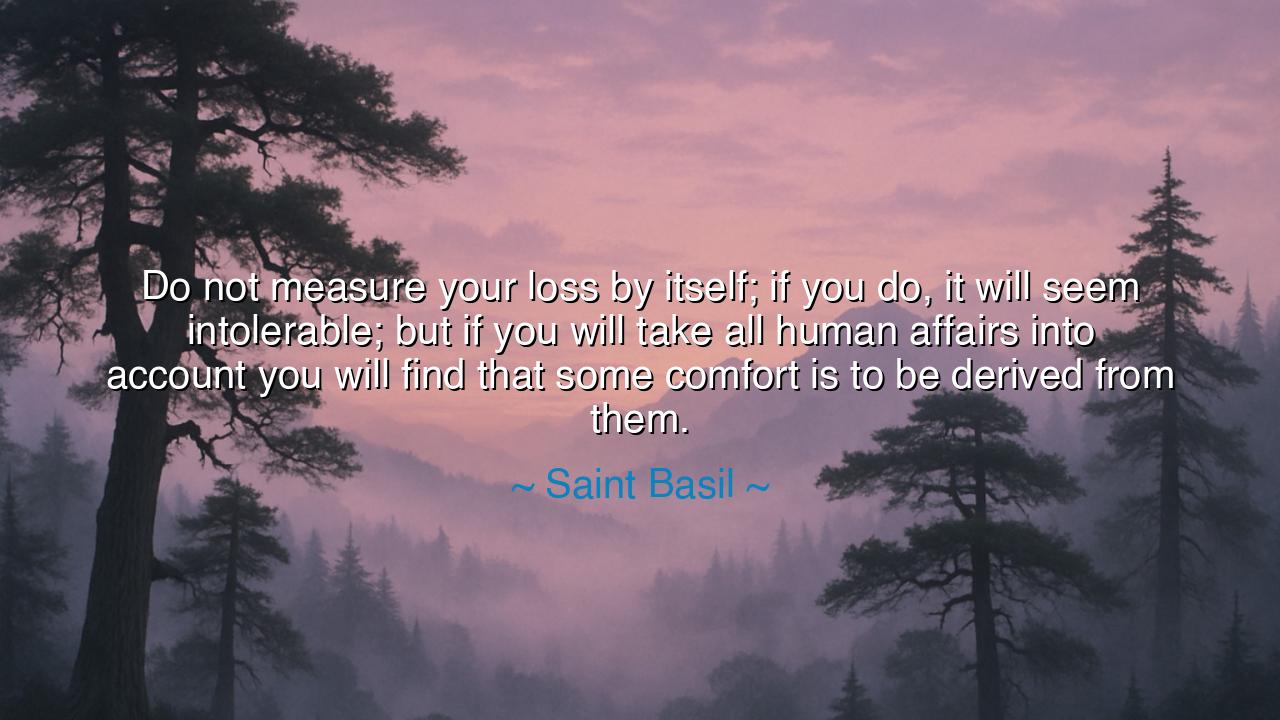
Do not measure your loss by itself; if you do, it will seem
Do not measure your loss by itself; if you do, it will seem intolerable; but if you will take all human affairs into account you will find that some comfort is to be derived from them.






Hear the voice of Saint Basil, one of the great fathers of the early Church, who spoke not only to his own generation but to all who suffer: “Do not measure your loss by itself; if you do, it will seem intolerable; but if you will take all human affairs into account you will find that some comfort is to be derived from them.” In these words lies a teaching as old as sorrow itself: that grief, when viewed alone, feels like an unbearable burden, but when set within the greater frame of human life and destiny, it can be endured, and even softened.
For loss in its immediacy is overwhelming. When a loved one dies, when fortune collapses, when health fails, the soul looks only at the wound before it and feels crushed. The heart whispers, “This pain is unlike any other, and it cannot be borne.” Yet Basil reminds us that this is but the trick of isolation. When we place our grief beside the grief of countless others, when we remember that suffering belongs to the common lot of humanity, our sorrow does not vanish, but it becomes more bearable, for we see that we are not alone.
The ancients knew this wisdom. The Stoics taught that to live is to suffer loss, and that what happens to one happens to all. Marcus Aurelius, emperor and philosopher, endured the deaths of his children, yet counseled himself: “What befalls you has befallen many; what wounds you has wounded the world before.” In this knowledge, he found the strength to endure without bitterness. Basil, speaking centuries later, echoes this same truth, yet clothes it with Christian compassion: we are bound together not only in suffering, but also in comfort, in shared humanity, and in divine hope.
Consider the tale of Job, who sat in the ashes, stripped of wealth, family, and health. His grief was deep, but part of his torment was his isolation—the sense that his pain was beyond measure. Yet when God finally spoke, He reminded Job of the vastness of creation, the sweep of human destiny, and the eternal order beyond his momentary suffering. In that broader view, Job found humility, strength, and consolation. His loss, no longer seen in isolation, became part of a larger story that gave him endurance.
So too in history we see this lesson. After the Second World War, whole nations lay in ruins. Cities bombed, families shattered, millions grieving. Yet in the shared recognition that all had suffered, survivors found the strength to rebuild. Grief measured alone would have destroyed the spirit; grief seen as part of a vast, common tragedy brought solidarity, healing, and eventually renewal. Human affairs—when seen in their wholeness—become the soil in which consolation grows.
The lesson for you, O listener of wisdom, is this: when grief comes, do not stare only at your wound. Lift your eyes to the wider horizon of life. Remember that others have suffered and endured, that sorrow has touched every home, every heart, and yet life continues. This does not diminish your pain, but it places it within the fellowship of humanity. In knowing that you are not alone, you may find strength where before there was only despair.
Practical steps are these: when loss overwhelms you, read the stories of others who have endured. Seek out community, for shared sorrow becomes lighter when borne together. Write down your pain, but then write also the names of others who carry burdens like yours. Train your mind to see not only your wound but the great pattern of human life, where suffering and joy are interwoven. In this perspective, you will discover the comfort Saint Basil spoke of—the knowledge that grief, though heavy, is never singular, and that the heart is stronger when it beats in unity with all humanity.
Thus remember his wisdom: do not measure loss by itself. Alone, it crushes; together, it humbles and consoles. Place your sorrow within the vastness of human life, and you will find that even in grief, there is kinship, and even in loss, there is hope. For no one suffers alone, and in the company of all mankind, strength is always found anew.






AAdministratorAdministrator
Welcome, honored guests. Please leave a comment, we will respond soon